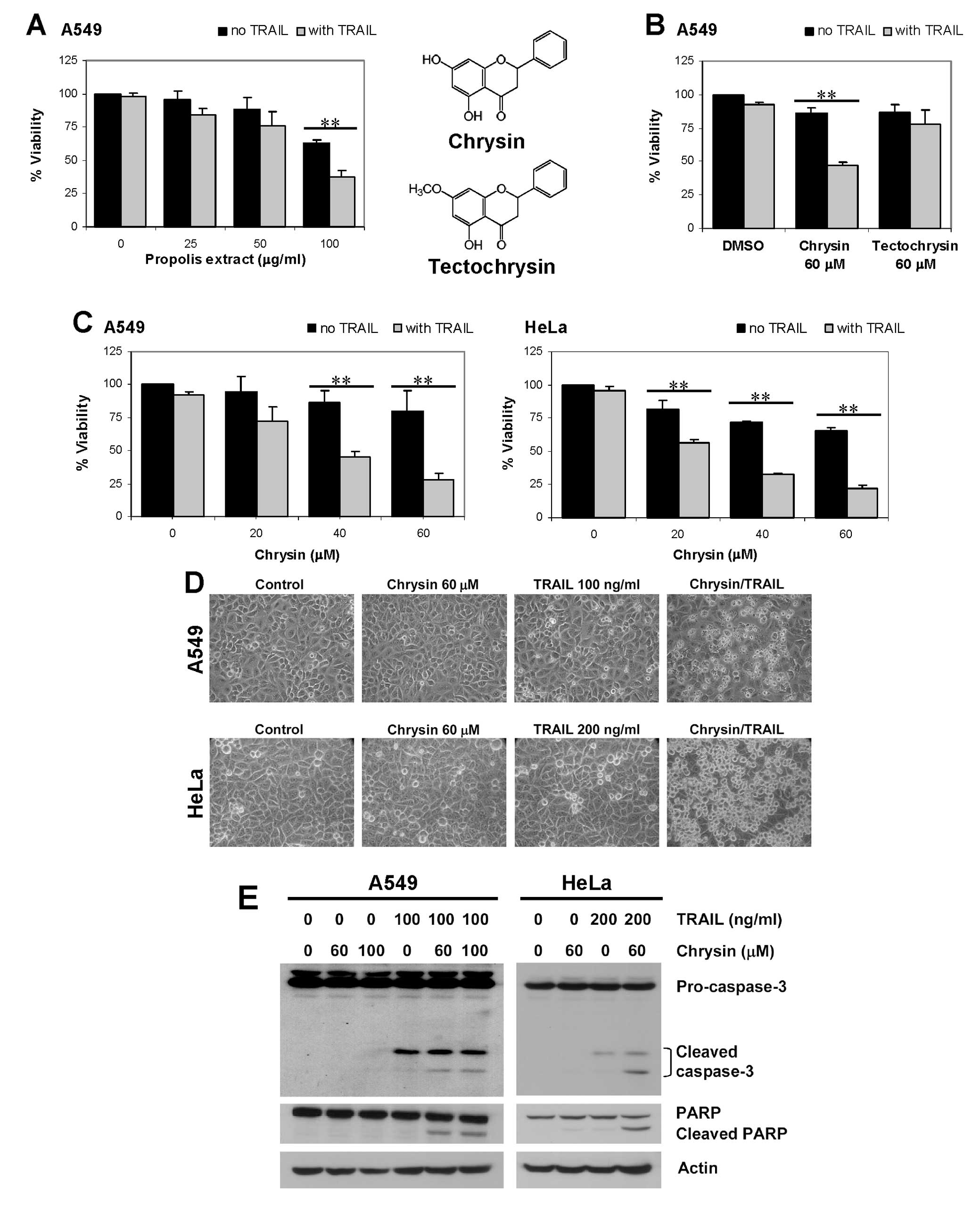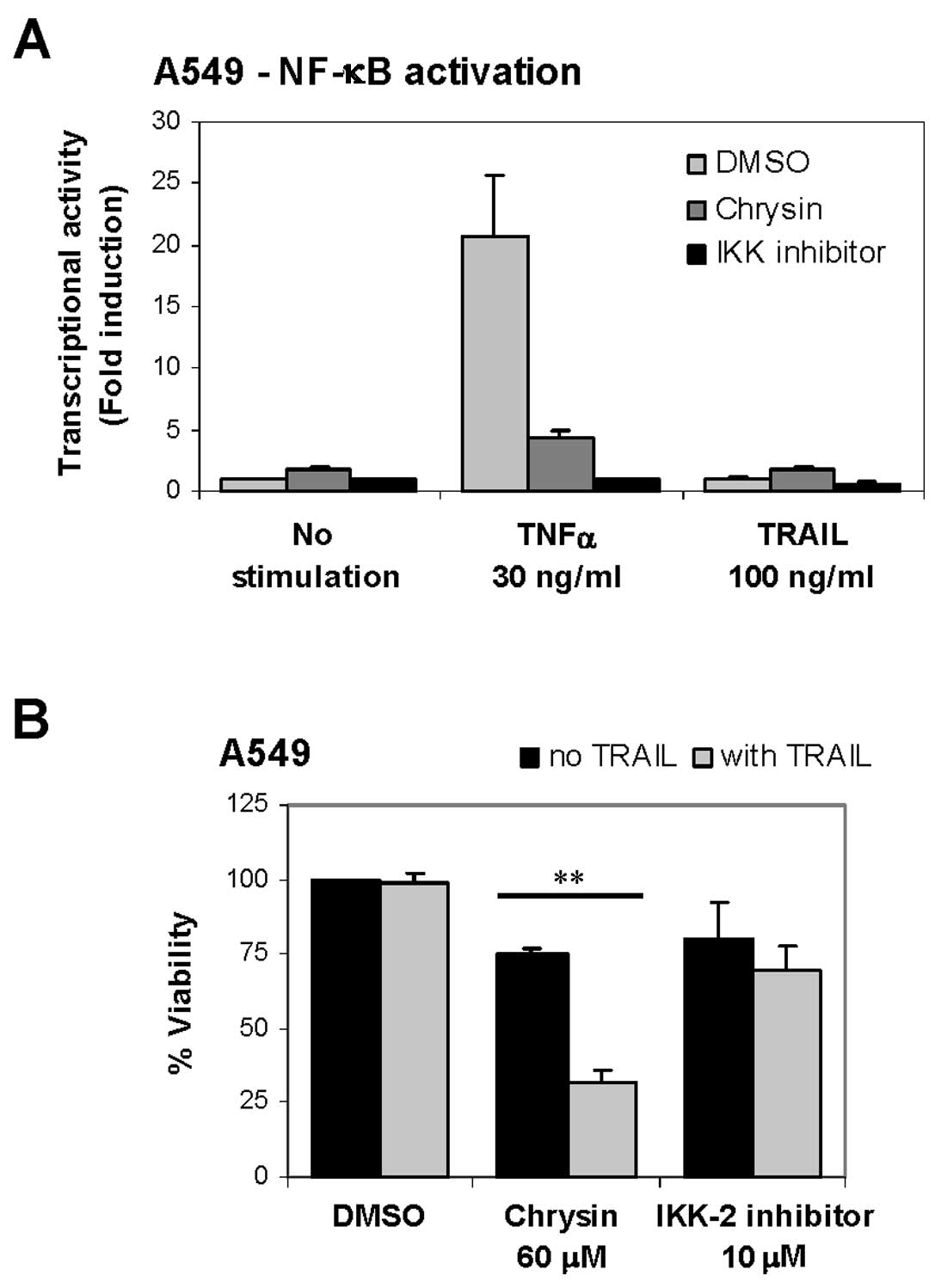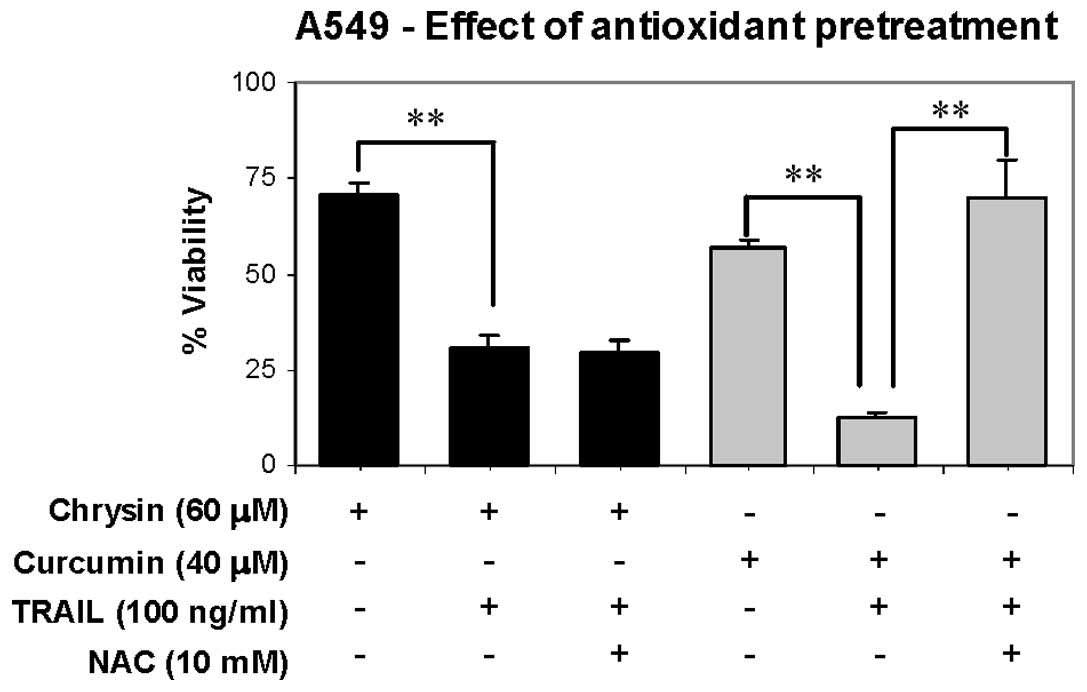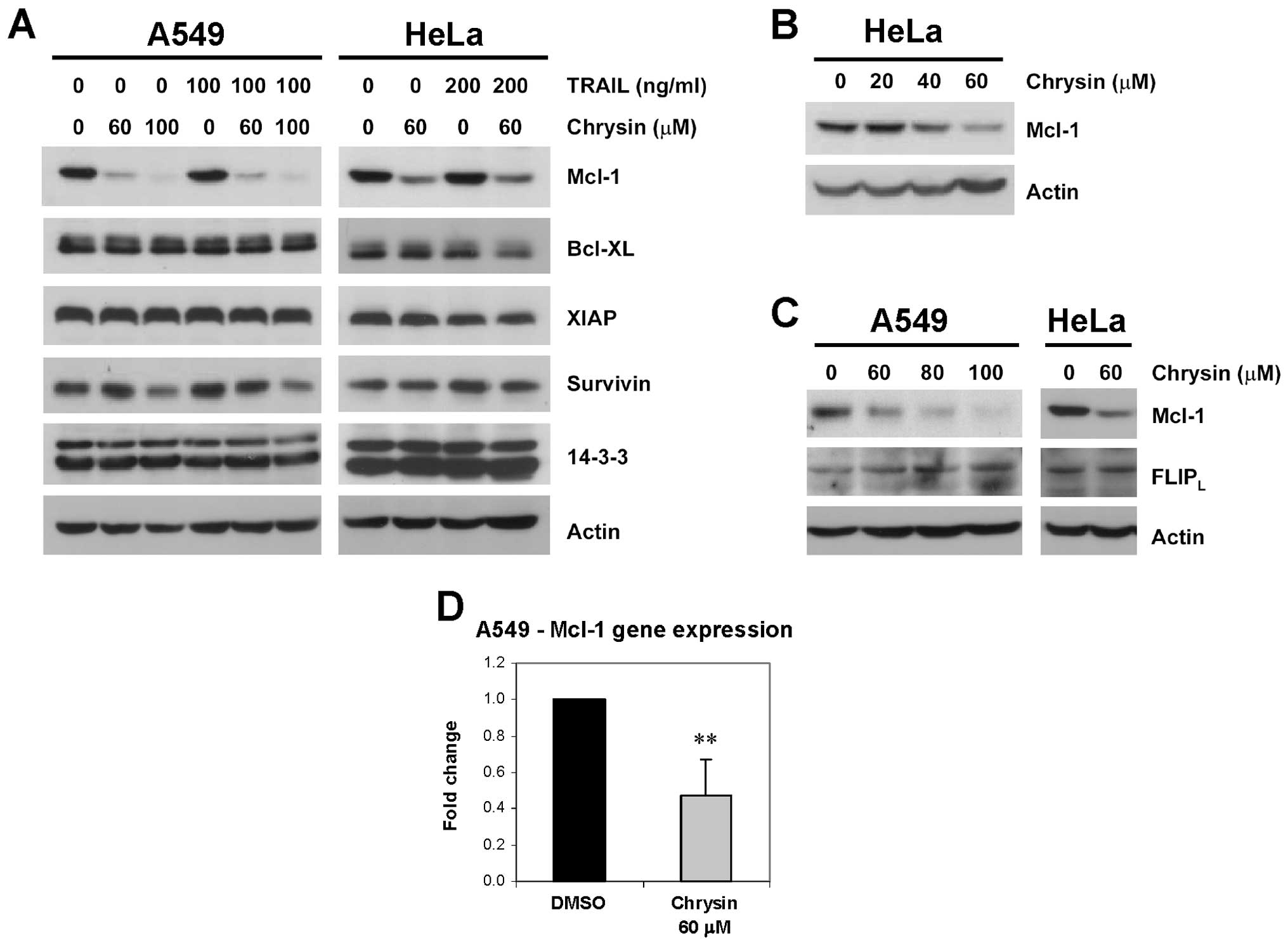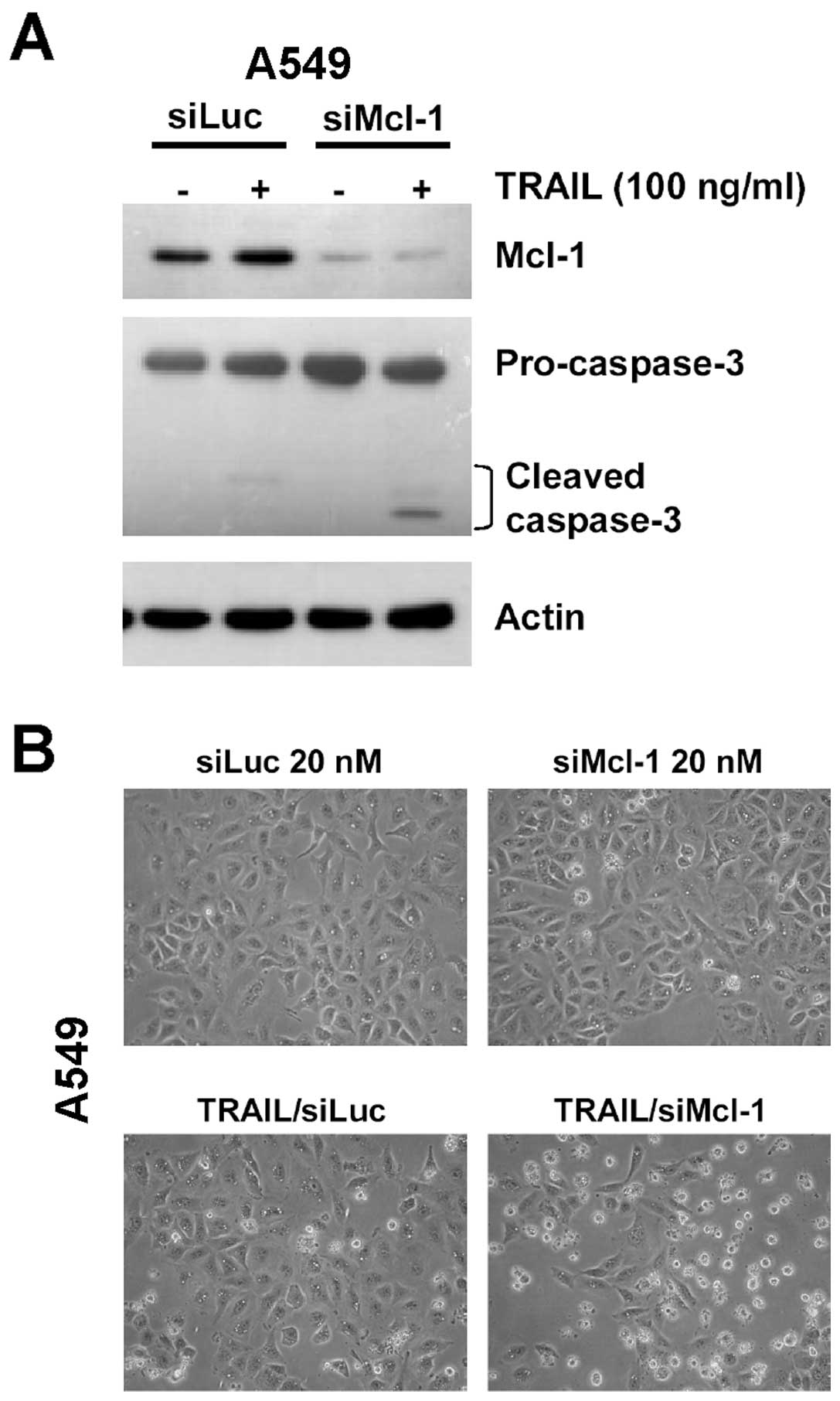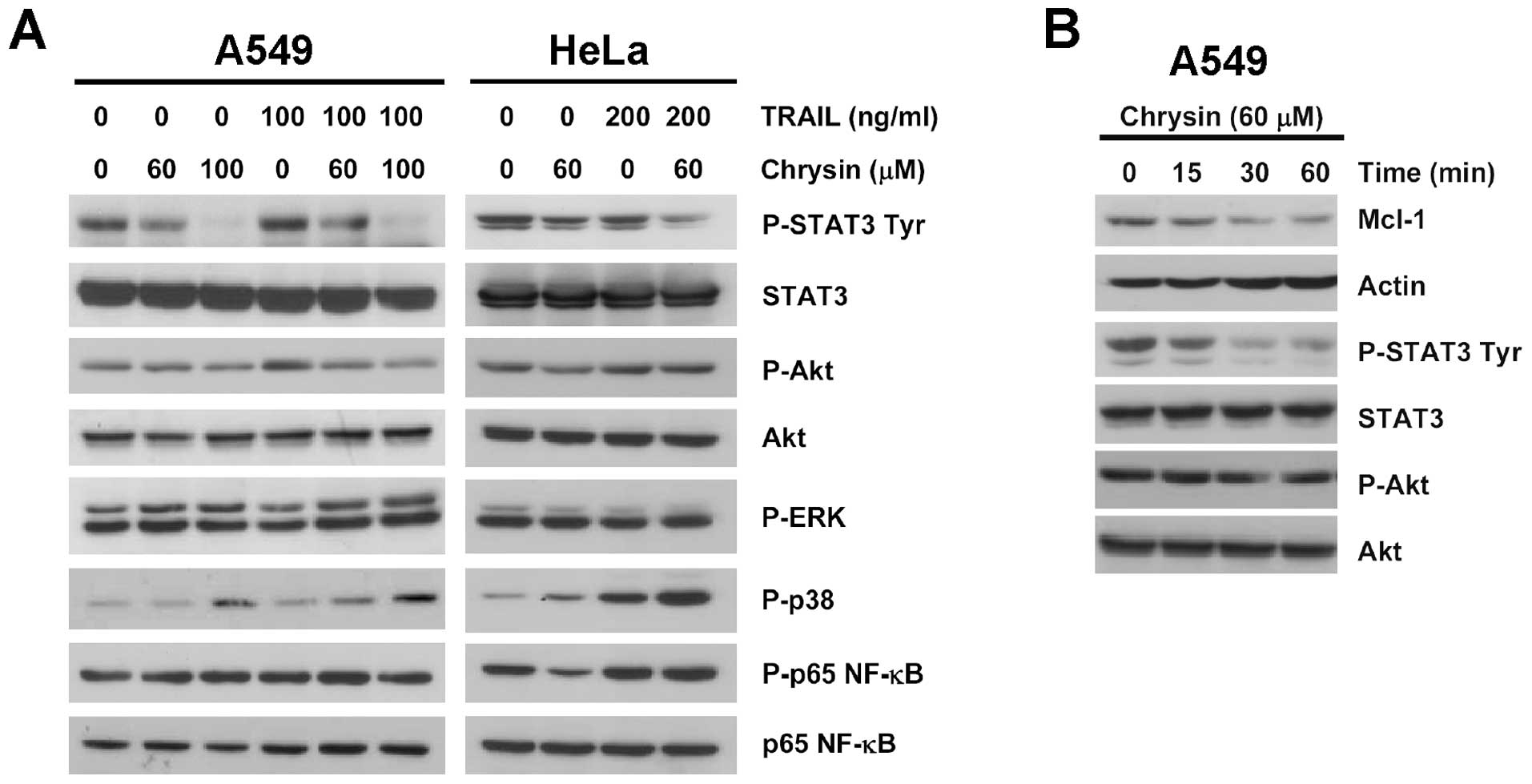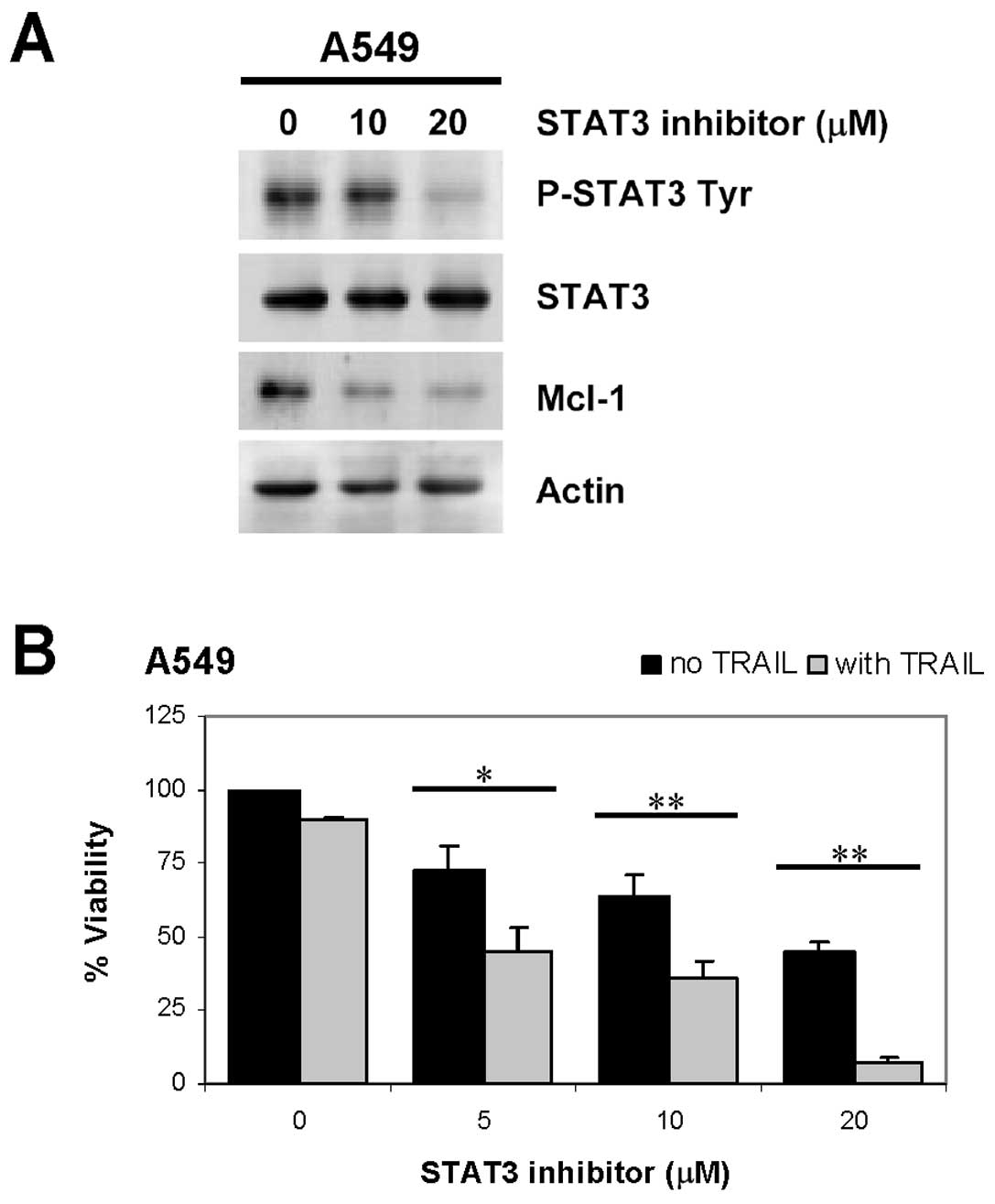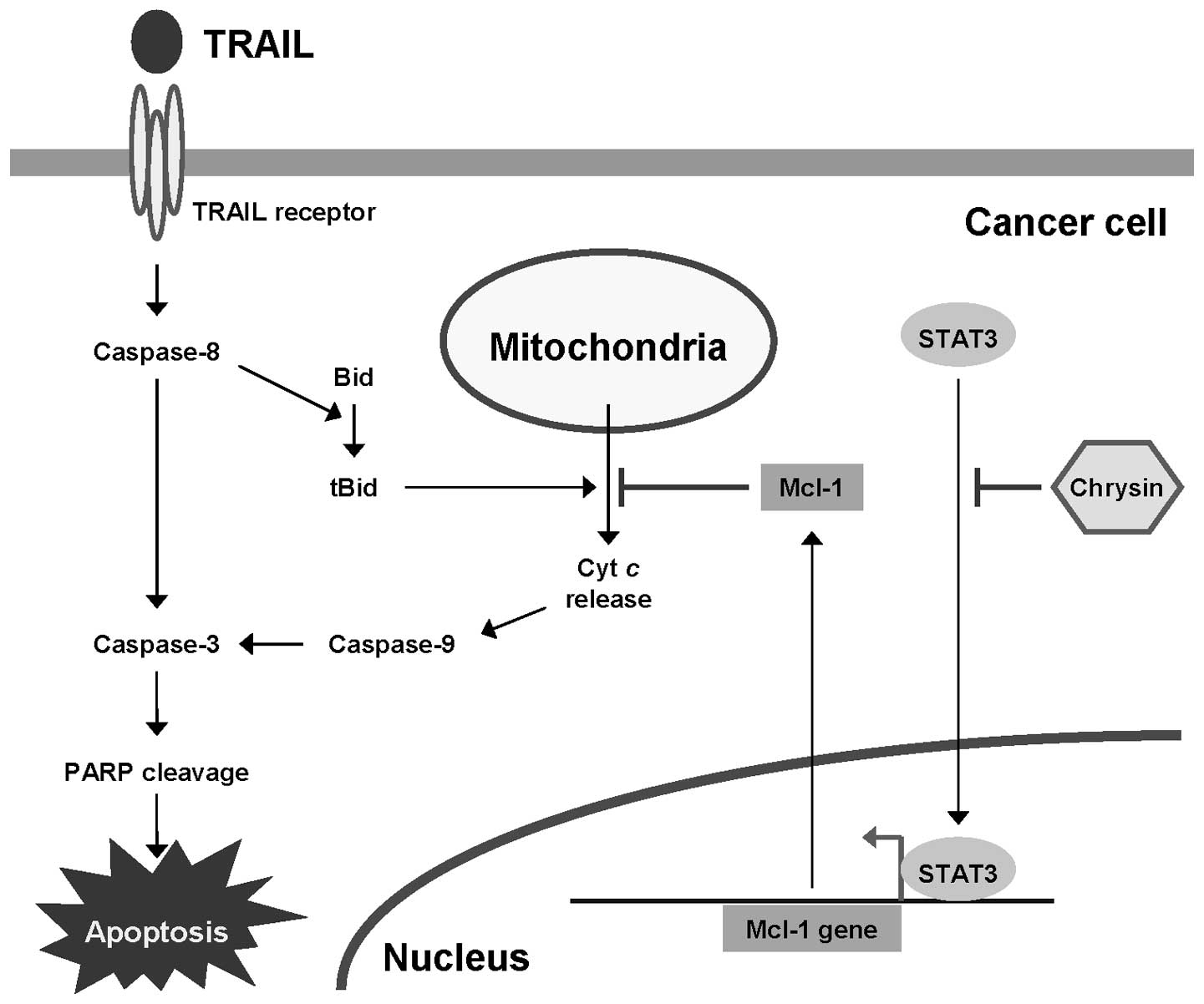|
1.
|
Kruyt FA: TRAIL and cancer therapy. Cancer
Lett. 263:14–25. 2008. View Article : Google Scholar : PubMed/NCBI
|
|
2.
|
Wang S: The promise of cancer therapeutics
targeting the TNF-related apoptosis-inducing ligand and TRAIL
receptor pathway. Oncogene. 27:6207–6215. 2008. View Article : Google Scholar : PubMed/NCBI
|
|
3.
|
Hellwig CT and Rehm M: TRAIL signaling and
synergy mechanisms used in TRAIL-based combination therapies. Mol
Cancer Ther. 11:3–13. 2012. View Article : Google Scholar : PubMed/NCBI
|
|
4.
|
Mahalingam D, Szegezdi E, Keane M, de Jong
S and Samali A: TRAIL receptor signalling and modulation: are we on
the right TRAIL? Cancer Treat Rev. 35:280–288. 2009. View Article : Google Scholar : PubMed/NCBI
|
|
5.
|
Ishibashi M and Ohtsuki T: Studies on
search for bioactive natural products targeting TRAIL signaling
leading to tumor cell apoptosis. Med Res Rev. 28:688–714. 2008.
View Article : Google Scholar : PubMed/NCBI
|
|
6.
|
Bankova V: Recent trends and important
developments in propolis research. Evid Based Complement Alternat
Med. 2:29–32. 2005. View Article : Google Scholar : PubMed/NCBI
|
|
7.
|
Szliszka E, Czuba ZP, Domino M, Mazur B,
Zydowicz G and Krol W: Ethanolic extract of propolis (EEP) enhances
the apoptosis-inducing potential of TRAIL in cancer cells.
Molecules. 14:738–754. 2009. View Article : Google Scholar : PubMed/NCBI
|
|
8.
|
Awale S, Shrestha SP, Tezuka Y, Ueda JY,
Matsushige K and Kadota S: Neoflavonoids and related constituents
from Nepalese propolis and their nitric oxide production inhibitory
activity. J Nat Prod. 68:858–864. 2005. View Article : Google Scholar : PubMed/NCBI
|
|
9.
|
Awale S, Li F, Onozuka H, Esumi H, Tezuka
Y and Kadota S: Constituents of Brazilian red propolis and their
preferential cytotoxic activity against human pancreatic PANC-1
cancer cell line in nutrient-deprived condition. Bioorg Med Chem.
16:181–189. 2008. View Article : Google Scholar : PubMed/NCBI
|
|
10.
|
Hernandez J, Goycoolea FM, Quintero J, et
al: Sonoran propolis: chemical composition and antiproliferative
activity on cancer cell lines. Planta Med. 73:1469–1474. 2007.
View Article : Google Scholar : PubMed/NCBI
|
|
11.
|
Woo KJ, Jeong YJ, Park JW and Kwon TK:
Chrysin-induced apoptosis is mediated through caspase activation
and Akt inactivation in U937 leukemia cells. Biochem Biophys Res
Commun. 325:1215–1222. 2004. View Article : Google Scholar : PubMed/NCBI
|
|
12.
|
Weng MS, Ho YS and Lin JK: Chrysin induces
G1 phase cell cycle arrest in C6 glioma cells through inducing
p21Waf1/Cip1 expression: involvement of p38 mitogen-activated
protein kinase. Biochem Pharmacol. 69:1815–1827. 2005. View Article : Google Scholar
|
|
13.
|
Kachadourian R, Leitner HM and Day BJ:
Selected flavonoids potentiate the toxicity of cisplatin in human
lung adenocarcinoma cells: a role for glutathione depletion. Int J
Oncol. 31:161–168. 2007.
|
|
14.
|
Brechbuhl HM, Kachadourian R, Min E, Chan
D and Day BJ: Chrysin enhances doxorubicin-induced cytotoxicity in
human lung epithelial cancer cell lines: the role of glutathione.
Toxicol Appl Pharmacol. 258:1–9. 2012. View Article : Google Scholar : PubMed/NCBI
|
|
15.
|
Li X, Huang Q, Ong CN, Yang XF and Shen
HM: Chrysin sensitizes tumor necrosis factor-alpha-induced
apoptosis in human tumor cells via suppression of nuclear
factor-kappaB. Cancer Lett. 293:109–116. 2010. View Article : Google Scholar
|
|
16.
|
Li X, Wang JN, Huang JM, et al: Chrysin
promotes tumor necrosis factor (TNF)-related apoptosis-inducing
ligand (TRAIL) induced apoptosis in human cancer cell lines.
Toxicol In Vitro. 25:630–635. 2011. View Article : Google Scholar
|
|
17.
|
Wagner H, Chari VM and Sonnenbichler J:
13C-NMR-spektren natürlich vorkommender flavonoide. Tetrahedron
Lett. 17:1799–1802. 1976.(In German).
|
|
18.
|
Gaydou EM and Bianchini JP: Études de
composés flavoniques I. Synthèses et propriétés (UV, RMN du 13C) de
quelques flavones. Bull Soc Chim Fr II. 43–47. 1978.
|
|
19.
|
Choo MK, Kawasaki N, Singhirunnusorn P, et
al: Blockade of transforming growth factor-beta-activated kinase 1
activity enhances TRAIL-induced apoptosis through activation of a
caspase cascade. Mol Cancer Ther. 5:2970–2976. 2006. View Article : Google Scholar
|
|
20.
|
Lirdprapamongkol K, Kramb JP,
Suthiphongchai T, et al: Vanillin suppresses metastatic potential
of human cancer cells through PI3K inhibition and decreases
angiogenesis in vivo. J Agric Food Chem. 57:3055–3063. 2009.
View Article : Google Scholar
|
|
21.
|
Lirdprapamongkol K, Sakurai H, Suzuki S,
et al: Vanillin enhances TRAIL-induced apoptosis in cancer cells
through inhibition of NF-kappaB activation. In Vivo. 24:501–506.
2010.
|
|
22.
|
Yu C, Bruzek LM, Meng XW, et al: The role
of Mcl-1 downregulation in the proapoptotic activity of the
multikinase inhibitor BAY 43-9006. Oncogene. 24:6861–6869. 2005.
View Article : Google Scholar : PubMed/NCBI
|
|
23.
|
Unger RE, Krump-Konvalinkova V, Peters K
and Kirkpatrick CJ: In vitro expression of the endothelial
phenotype: comparative study of primary isolated cells and cell
lines, including the novel cell line HPMEC-ST1.6R. Microvasc Res.
64:384–397. 2002. View Article : Google Scholar
|
|
24.
|
Livak KJ and Schmittgen TD: Analysis of
relative gene expression data using real-time quantitative PCR and
the 2(-Delta Delta C(T)) method. Methods. 25:402–408. 2001.
View Article : Google Scholar : PubMed/NCBI
|
|
25.
|
Jung EM, Lim JH, Lee TJ, Park JW, Choi KS
and Kwon TK: Curcumin sensitizes tumor necrosis factor-related
apoptosis-inducing ligand (TRAIL)-induced apoptosis through
reactive oxygen species-mediated upregulation of death receptor 5
(DR5). Carcinogenesis. 26:1905–1913. 2005. View Article : Google Scholar
|
|
26.
|
Jacquemin G, Shirley S and Micheau O:
Combining naturally occurring polyphenols with TNF-related
apoptosis-inducing ligand: a promising approach to kill resistant
cancer cells? Cell Mol Life Sci. 67:3115–3130. 2010. View Article : Google Scholar
|
|
27.
|
Bannerman DD, Tupper JC, Ricketts WA,
Bennett CF, Winn RK and Harlan JM: A constitutive cytoprotective
pathway protects endothelial cells from lipopolysaccharide-induced
apoptosis. J Biol Chem. 276:14924–14932. 2001. View Article : Google Scholar
|
|
28.
|
Akgul C: Mcl-1 is a potential therapeutic
target in multiple types of cancer. Cell Mol Life Sci.
66:1326–1336. 2009. View Article : Google Scholar : PubMed/NCBI
|
|
29.
|
Aggarwal BB, Kunnumakkara AB, Harikumar
KB, et al: Signal transducer and activator of transcription-3,
inflammation, and cancer: how intimate is the relationship? Ann NY
Acad Sci. 1171:59–76. 2009. View Article : Google Scholar : PubMed/NCBI
|
|
30.
|
Meng XW, Lee SH, Dai H, et al: Mcl-1 as a
buffer for proapoptotic Bcl-2 family members during TRAIL-induced
apoptosis: a mechanistic basis for sorafenib (Bay 43-9006)-induced
TRAIL sensitization. J Biol Chem. 282:29831–29846. 2007. View Article : Google Scholar
|
|
31.
|
Hsieh FC, Cheng G and Lin J: Evaluation of
potential Stat3-regulated genes in human breast cancer. Biochem
Biophys Res Commun. 335:292–299. 2005. View Article : Google Scholar : PubMed/NCBI
|
|
32.
|
Nijhawan D, Fang M, Traer E, et al:
Elimination of Mcl-1 is required for the initiation of apoptosis
following ultraviolet irradiation. Genes Dev. 17:1475–1486. 2003.
View Article : Google Scholar : PubMed/NCBI
|
|
33.
|
Poukkula M, Kaunisto A, Hietakangas V, et
al: Rapid turnover of c-FLIPshort is determined by its unique
C-terminal tail. J Biol Chem. 280:27345–27355. 2005. View Article : Google Scholar : PubMed/NCBI
|
|
34.
|
Dong Y, Yin S, Li J, Jiang C, Ye M and Hu
H: Bufadienolide compounds sensitize human breast cancer cells to
TRAIL-induced apoptosis via inhibition of STAT3/Mcl-1 pathway.
Apoptosis. 16:394–403. 2011. View Article : Google Scholar
|
|
35.
|
Huang S and Sinicrope FA: Sorafenib
inhibits STAT3 activation to enhance TRAIL-mediated apoptosis in
human pancreatic cancer cells. Mol Cancer Ther. 9:742–750. 2010.
View Article : Google Scholar : PubMed/NCBI
|
|
36.
|
Chen KF, Tai WT, Liu TH, et al: Sorafenib
overcomes TRAIL resistance of hepatocellular carcinoma cells
through the inhibition of STAT3. Clin Cancer Res. 16:5189–5199.
2010. View Article : Google Scholar : PubMed/NCBI
|
|
37.
|
Polier G, Ding J, Konkimalla BV, et al:
Wogonin and related natural flavones are inhibitors of CDK9 that
induce apoptosis in cancer cells by transcriptional suppression of
Mcl-1. Cell Death Dis. 2:e1822011. View Article : Google Scholar : PubMed/NCBI
|
|
38.
|
Phan T, Yu XM, Kunnimalaiyaan M and Chen
H: Antiproliferative effect of chrysin on anaplastic thyroid
cancer. J Surg Res. 170:84–88. 2011. View Article : Google Scholar : PubMed/NCBI
|
|
39.
|
Wang S and Fischer PM: Cyclin-dependent
kinase 9: a key transcriptional regulator and potential drug target
in oncology, virology and cardiology. Trends Pharmacol Sci.
29:302–313. 2008. View Article : Google Scholar : PubMed/NCBI
|
|
40.
|
Giraud S, Hurlstone A, Avril S and
Coqueret O: Implication of BRG1 and cdk9 in the STAT3-mediated
activation of the p21waf1 gene. Oncogene. 23:7391–7398. 2004.
View Article : Google Scholar : PubMed/NCBI
|
|
41.
|
Hou T, Ray S and Brasier AR: The
functional role of an interleukin 6-inducible CDK9. STAT3 complex
in human gamma-fibrinogen gene expression. J Biol Chem.
282:37091–37102. 2007. View Article : Google Scholar : PubMed/NCBI
|
|
42.
|
Fu B, Xue J, Li Z, Shi X, Jiang BH and
Fang J: Chrysin inhibits expression of hypoxia-inducible
factor-1alpha through reducing hypoxia-inducible factor-1alpha
stability and inhibiting its protein synthesis. Mol Cancer Ther.
6:220–226. 2007. View Article : Google Scholar
|
|
43.
|
Von Brandenstein MG, Ngum Abety A, Depping
R, et al: A p38-p65 transcription complex induced by endothelin-1
mediates signal transduction in cancer cells. Biochim Biophys Acta.
1783:1613–1622. 2008.PubMed/NCBI
|
|
44.
|
Shao JJ, Zhang AP, Qin W, Zheng L, Zhu YF
and Chen X: AMP-activated protein kinase (AMPK) activation is
involved in chrysin-induced growth inhibition and apoptosis in
cultured A549 lung cancer cells. Biochem Biophys Res Commun.
423:448–453. 2012. View Article : Google Scholar
|















